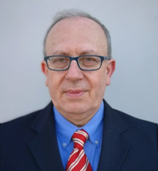PETRAZZUOLI, Dr Ferdinando
Italy – Family doctor, EURIPA Scientific Bd
 Ferdinando is the Chair of the European Rural and Isolated Practitioners Association (EURIPA) Scientific Board and has attended every WONCA Europe conference since 2001!
Ferdinando is the Chair of the European Rural and Isolated Practitioners Association (EURIPA) Scientific Board and has attended every WONCA Europe conference since 2001!
What work do you do now?
I am a middle-aged Italian family doctor who lives and works in a rural village in Southern Italy. My rural home village is called Ruviano and is located in the province of Caserta, Campania region. It has less than 2000 inhabitants and is about a one-hour drive from Naples. I work in a solo doctor practice and my surgery is in a wing of my own house.
Living and working in the same building has its advantages and disadvantages. You save time and money but are on call all the time. My patient list consists of nearly 1500 patients. Over 35% of my patients are over the age of 65. (Children under six years are cared for by the local health district paediatrician.) Many patients are farmers.
Other interesting things you have done?
I started attending the WONCA Europe Conferences in 2001 in Tampere Finland, and since then I have never missed one.
In 2002, I started attending the
European General Practice Research Network (EGPRN) Conferences in Avignon, France, and in 2008, I became the Italian national representative of this organisation. I spent three terms (nine years) on the EGPRN executive board where I ended my service as vice-chair.
I joined the European Rural and Isolated Practitioners Association (EURIPA), in 2006, introduced by the beloved and never forgotten Claudio Carosino, and I have been involved in many initiatives over the past 15 years, sometimes joint EGPRN / EURIPA activities,.
I have always been interested in research. In previous work at University I had carried out quite a lot of research in cardiology so, when I left University there was something missing. Stimulated by my international colleagues in WONCA Europe (and its networks), I managed to get a Master of Science (MSc) in Primary Care & General Practice at the University of Ulster (United Kingdom) in June 2008.
In June 2019, aged nearly 61, I defended my PhD thesis at the Center for Primary Health Care Research, Department of Clinical Sciences in Malmö, Lund University, Sweden. The title of my thesis: Dementia Management in European Primary Care.
In EGPRN I am still active. I have developed and implemented a web-based course in research in family medicine. This project is led also by Profs Mehmet Ungan and Shlomo Vinker and is composed of 25 web-based modules and a final workshop.
I am a member of the WONCA Europe Communications Advisory Board (WECAB) and also member of the WICC, the WONCA (World) international Classification Committee.
In 2018, I joined the WONCA Working Party on Mental Health, and I lead of the Dementia Group. I am also the first author of the chapter on dementia of the WONCA Book,
“Global Primary Mental Health Care: Practical Guidance for Family Doctors” published in December 2019.
What is your role on EURIPA and can you tell us a little about EURIPA?
EURIPA is a representative network organisation of WONCA Europe and was founded by rural family doctors to address the health and wellbeing needs of rural communities and the professional needs of those serving them across Europe. Recruiting and retaining young general practitioners in rural areas is one of the main visons of EURIPA. Recently, I have been nominated chair of the EURIPA Scientific Board.
What are your interests inside and outside work?
I have managed to publish several articles on rural medicine in rural primary care journals, and I think that rural communities are extraordinary opportunities to conduct more holistic, integrative, and relevant research using new methods and data sources.
I love the countryside all over the world and I personally think that protecting our beautiful genuine rural villages, our mountains, our little islands from being abandoned by their populations requires the provision of a good quality primary care. The massive emigration of population from our calm rural areas to troubled suburban living with high social disenfranchisement is one of the worst possible future scenarios, which is already happening, creating big social problems. Having good health care in rural areas is not only a health issue but also a public policy issue.